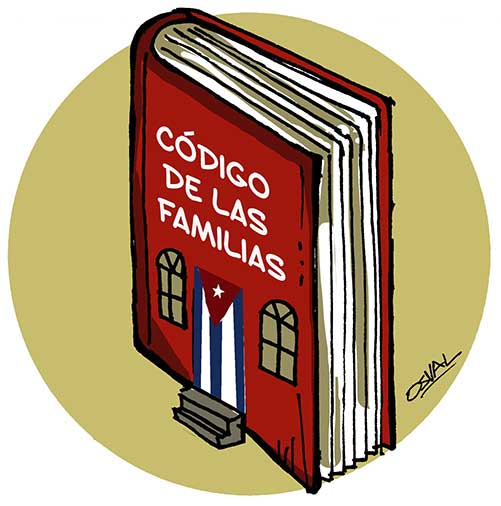
The first meetings of the popular consultation of the Family Code Project make it clear that greater knowledge of the text is needed to participate in its analysis. Obviously, the late arrival of the tabloids, just last Monday, attempted against the interventions at the start, but between now and April 30 that scenario must change.
For the second time in less than five years, we, Cubans, have the possibility of committing ourselves to the review, drafting and referendum of a far-reaching legislative text, a norm that points to the center of society: families.
There is more than enough argumentation of the transcendental of the moment. All the logic in the world indicates that if the Code regulates the family environment, it is the responsibility of each one of its members to know what is new in the Project, what is maintained or updated, what is eliminated. Only that understanding will give way to the necessary reflection and positioning against its postulates.
Quick and simple we could say that democracy also takes shape in meeting nights before the novel.
• Review our coverage of the Family Code
Moreover, you may not be 100 percent in agreement with what is written, of course it is valid to have doubts, just as misunderstandings are possible in a sea of legal jargon and hundreds of interconnected articles. That is why the popular consultation does not come wrapped in indoctrination or impositions; just the opposite. In the spirit of the call, an incontestable truth can be read: from the diversity of opinions, from the variety of proposals, a better text can come out.
Nevertheless, for this, two essential requirements must be met: knowing the norm and being there, in the consultation. The electoral authorities have designed a space that should be attended, on average, by a hundred people. It is known that the first week is almost a warm-up of all the structures and we should not judge the quality of the process by its initial steps. However, while massiveness in other spheres sometimes dilutes efficiency, here the more people express their criteria, the more possibilities there are of achieving the maximum aspiration of representativeness.
Let no one say later “they didn't ask me”; “they didn't take my opinion into account”, “why do they ask for opinions if it's already been decided”. The conception of the query allows not only to raise one's hand and say what one thinks—without the harmful practice of stopping dissonance or trying to convince the person to the contrary—but also to verify that what has been said is as it is. Every citizen has the right to verify that his or her words are recorded accurately.
This fidelity is born, we insist, from knowing in a general way the bulk of the titles and articles of the Code..., and in detail those that are considered pertinent to modify. On what grounds, if not, might a statement be suggested to be deleted? How, if not by asking a question, could we check that our assumptions or interpretations are correct? Isn't it better to think with one's own head than to uncritically repeat what a third party says the Code says?
I write it this way: my people take a little while to study it, to carefully read those articles that make us "cut" because we are reading them with "old" eyes, to ponder the collective profits and with a vision of the future on the benefit immediate single. The text will not mold or draw the country in its image and likeness; rather it is the other way around. That country of different families already exists.
Cuba deserves a modern Family Code. Just as we like to be fashionable with music, clothes or cell phones, it is convenient to take the leap in this area. I say it so plainly, but it is very clear that shielding the rights long awaited by groups of people (no longer minorities) has nothing to do with the ups and downs of the color of the year or the model of the telephone. It does have to do with respect for dignity of every one of us.
